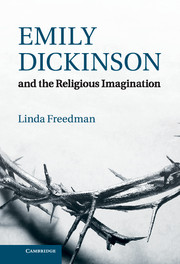Chapter 2 - Beginning from the name
Published online by Cambridge University Press: 07 September 2011
Summary
Following the story of the Gospel, this chapter takes inspiration from Christ’s Baptism. This is the first time the Word made flesh allows for verbal communication between God and man as God names Christ his ‘son’. As a naming event that looks forwards to the ‘son[’s]’ return to Heaven, it also opens up the same tension between the absolute Word and the mortal flesh that was the focus of the previous chapter. Dickinson drew from the way in which the incarnation informed the Puritan ritual of Baptism to explore her sense that the poetic possibilities of sacramental mediation lie in the compromised vision suggested by the given ‘name’. Her sense of this compromised vision was rooted in a fundamental post-lapsarian opening between essence and representation. While Dickinson played with the idea of essential nameless truths, she could never reconcile her handling of them. So she found inspiration for the shifting texture of her poetic voice in the mediatory Baptismal ‘name’. The poems discussed here simultaneously enact the difficulty of voicing namelessness and invite reflection on the theological meaning of sacramental mediation.
Fictions of naming
The poet who wrote to Thomas Wentworth Higginson, ‘I enclose my name – asking you, if you please – Sir – to tell me what is true?’ clearly understood the sense of identity that a name implied. On the one hand, names signify fixity. They tie you to your family and your family’s expectations. They are the means by which you are known and by which you know others. They stand as your representative but they can also be changed, adopted, discarded and manipulated to seal others into a relationship with you. Philosophers from Plato onwards have considered the name to be a shifting signifier of meaning. Dickinson, too, knew the power a name could hold.
- Type
- Chapter
- Information
- Emily Dickinson and the Religious Imagination , pp. 50 - 73Publisher: Cambridge University PressPrint publication year: 2011



